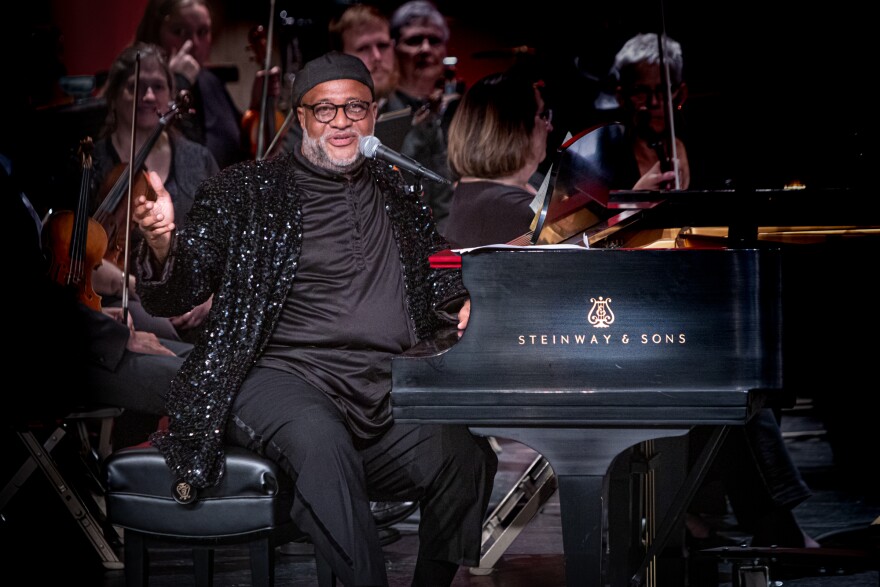Byron "BK" Davis grew up writing and playing music in his family's church in Davenport. By the age of 12, he was directing children's choirs and composing his own original tunes. He also won his sixth-grade talent show, singing and playing his own song. The victory compelled him to run for class president, and he won.
From the outside looking in, it would have appeared that Davis was destined for a career as a professional musician. But once Davis graduated from high school, he decided to join the military and did not consider becoming a musician until later in life.
Davis spoke with Talk of Iowa's Charity Nebbe about his musical journey, from the churches of Davenport to collaborating with artists like B.B. King and becoming Iowa's first Black Steinway International Artist.
Today, Davis makes his home in Burlington and performs around the world and in the Hawkeye state.
This transcript has been edited for length and clarity.
BK’s Introduction To Music
Davis: “Well, I think it was always there in my family. My mother had a grand piano in the living room in Davenport, Iowa. And folks from the church would come to Davenport or to Rock Island. We had a church over there as well. And a lot of times choir rehearsal would be right there in the living room. And so I grew up around it.”
Nebbe: “So it sounds like your mother was quite the musician, too. Is that right?”
Davis: “Well, yeah. Yeah, she's a great singer and a good pianist. And in fact, my first exposure to piano was actually just sitting next to her on the piano bench and listening.”
Nebbe: “Did she actually teach you how to play piano? Or was that something you needed to go outside the home to learn?"
Davis: "Well, she actually taught me. There are certain progressions, musically, that are very integral to the foundation or blueprint of music and songs. For example, with blues, many times you'll have three chords in some blues songs. And as, for example, in the key of C, it might be a dominant-C, dominant-seven, and F-dominant seven, G-dominant seven. With those three chords, you might play any number of songs. So basically, my mother exposed me to the dominant sevens, and I took a liking to it and dug in from that point."
Nebbe: "I mentioned that you made music in the churches where your father was a pastor, but your mom didn't just expose you to religious music? She was a big jazz fan, right?"
Davis: "Oh, my gosh. Yeah, in a huge way. I mean, in the house, there was always John Coltrane playing or Miles Davis, all of the great jazz artists. Not only musicians but vocalists as well. You know, Etta James, Aretha Franklin, Nancy Wilson. And just the entire spectrum of American music, pretty much, was what my diet was."
Nebbe: "So you were definitely exposed to the best of the best during those years. And you did make music in your father's churches. And, even, by the time you were 12 years old, you were writing songs and conducting the children's choir. Tell me about that."
Davis: "Yes, a lot of the folks I listened to, I dealt with, who came through our churches, a lot of the people were musical directors, and they would write songs. And at 12 years old, I was writing songs and I attended, at 12 years old, I was at Washington Elementary School in Davenport, Iowa, which is on East Locust Street. And I had written a song, and we had a talent show at Washington. And at 12 years old, I just somehow won the talent show because I had written a song. All the kids loved it. That propelled me to become sixth-grade student council president. So that was amazing, to see how much the kids loved the music."
On The Decision To Make Music Professionally
Davis: "Just like all young folks, as they move through life at some — and some people never — I mean, like when you go to college, you take either a specific study or you take liberal arts or whatever. And I wanted to do something specific with my life. And I decided a long, long time ago, at an early age, that it would be music. So I would just throw myself into it. And along the way here in Iowa and — again, my dad and mom had seven churches, and one was in Rock Island, Illinois, Macomb, Illinois, Galesburg, Kewanee. I can't remember where they all were, but that was a part of my training. And all of the friends and family, not only from the churches but even the folks in Davenport, the local school, teachers, all of my friends, the neighborhood folks. It seems like it's been a journey all by myself, but the truth is, it's been the entire community that has really put the wind into my sails and allowed me to go."
Nebbe: "When you did decide that you wanted to make music as a living, as a career, did you immediately know that jazz was the kind of music that you wanted to make?"
Davis: "Well, no. And even to this very day, I'm not sure whether it's jazz, to be honest. Because I find myself writing all the time, in different languages, in different styles. For example, if you Google one of my songs called “Let Me Comfort You,” I have a friend from Russia named Natalja Sticco. It's a duet. And the first part of the song, I sing it in English. And then Natalja comes with the second round of the music, and she's singing in Russian. Well, that's neither jazz nor blues nor pop. That particular composition is, I would classify it as R&B ... I would like to say that I compose jazz, but not really. Not really. Much of my music has a Latin rhythm and a beat. For example, I just wrote a song yesterday called 'A Lady in My Dreams' that's a samba. And so, in my catalog, I have several sambas, bossa novas.
"Also, you can hear if you go to 'Invisible Secret Concert,' April 10th I've got one called 'Something Warm,' which talks about how cold it gets here in Iowa in the winter. It's kind of like my, I guess, my tribute to Iowa, sort of … I just write all kinds of music. In fact, as I think as I look over my life, I think about the days when I lived in Indianapolis, Indiana, and I wrote jingles, commercials, TV and radio commercials for ASA productions. Geez, as a staff writer, I would get all types and styles of commercials that needed to be produced. And so that's where I had the opportunity to try my hand at just the entire spectrum of different kinds of music."

How Davis Became A Steinway International Artist
"Well, down through the years, around the globe, I have performed and/or recorded on Steinways in different countries. And at one point I was in Naples, Florida, having a conversation with a friend of mine who owns a Steinway piano gallery. And he said to me, he said, ‘my gosh, you know what? It seems to me that you would have all of the credentials necessary. You have a large body of original compositions. You have a large body of recorded music, and you've worked with a lot of notable people. It seems to me you would be a shoo-in at becoming a Steinway international recording artist.’ And I said, ‘yeah, well, okay, what's the process?’ And so he said to me, ‘well, you have to go through Manhattan and you put your package together of your recordings and your bio and a lot of stuff like that. And you send it into Manhattan. And then they will vet you globally.’ And it just so happened that I did have recordings from different places around the world that I saved. I had video and I had audio. And I, I turned it in to our headquarters in Manhattan. And it took a while. I was biting my nails, waiting to hear. And after about, I think, four to six months, I got a letter, a welcome letter, in the mail. It moved me. It moved me to tears. And so that was an amazing moment.
"And from that point, I began to perform what I called a Stevie Wonder tribute concert, where I did 90 minutes of Stevie Wonder music, which is also incredible training for songwriting and singing, because every day you have, you're doing 90 minutes of his music. And, the music burns itself into your mind. And so then when you begin to write your own songs, it just comes through. Not that I sound like Stevie Wonder, because I don't, I don't think. Not that I write like Stevie Wonder, because I don't, I think. But what it is is I found my voice, my style and my signature through studying the music of other people."
"How did becoming a Steinway artist transform your career? I think although, like I said, we know many Steinway artists, we may not know that they are Steinway artists. And of course, Dan Knight is a favorite here on Talk of Iowa, has been a Steinway international artist for many years. But how does that change things for you as a musician?"
"The biggest change that I can speak of is that, whenever I would make a call to go do a concert, the answer was almost always yes. As far as letting the public know, the house was usually pretty packed. I remember on one occasion in Houston, Texas — packed out. Dallas, packed out. Plano, all packed out. Whenever I decided to go perform, doors have flown open for me, and people attend, the audience. The attendance has been very, very good."






